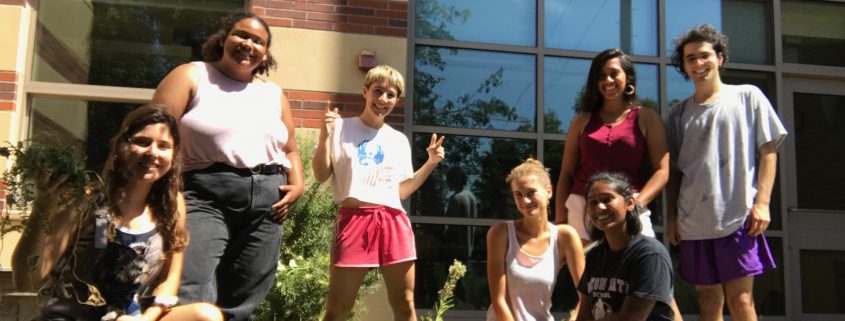Garden Club relaunches compost bins

(Photo courtesy of Garden Club)
Down a grassy path beside the Parkside dining hall lies one of USC’s hidden treasures: the Parkside Garden, a secluded area devoid of the manicured hedges that line much of campus. Instead, the garden is a natural haven of raised beds, a self-sustaining aquaponics system — and it’s full of bins of decomposing food waste.
According to Garden Club president Zannatul Zannat, compost bins have been in the Parkside Garden since the garden’s early days, years before the club’s founding in Spring 2019. Originally installed as part of a partnership with LA Compost, the compost system was left untended to as student involvement in the garden dwindled.
However, with the establishment of the Garden Club, the compost bins are back in use, breaking down food waste from the University community. While some of the composted material is Zannat’s own — she said she brings in the food waste from the Eco-op, where she lives — much of it is other students’ own scraps.
“People will actually save their food scraps and Tupperware and just take it to the compost system,” said Milena Castillo-Grynberg, vice president of the Garden Club and a senior majoring in environmental studies. “A lot of the pushback about composting is that people won’t want to do it because it’s gross or whatever, but people don’t really mind, and it’s not that bad because once you get it in there, you don’t need to deal with it anymore. You just close it up and hand-turn it.”
Zannat said the Garden Club is working on initiatives to promote composting on campus, encouraging students, faculty and Facilities Management Services staff to use the bins. Castillo-Grynberg said a large part of the initiative is spreading awareness about the garden’s compost system and educating members of the USC community about what types of food waste can be composted.
“We just want students to know that the space there exists,” Castillo-Grynberg said. “We want to have workshops for students about effectively composting, what they can compost, how to apply compost to your crops or like generally just how to improve your compost and the importance of composting.”
Zannat, a senior majoring in environmental studies, first learned of the garden as a junior while working on a research project about aquaponics with the USC Wrigley Institute for Environmental Studies.
“I came here to just check on [the system] … one day, this was exactly one year ago I think, one day I came by, and the aquaponics system was completely drained, and there was like dried, dead fish stuck to the bottom of it,” Zannat said. “I was just like, ‘How could we have let this happen? Like, who let this happen?’”
Zannat began looking into the system’s upkeep and discovered that until that point, no one had been in charge of maintaining the aquaponics system — or the rest of the garden — so she decided to create a club devoted to caring for the garden. She co-founded the Garden Club in Spring 2019 with an initial membership of six students. Since then, it has grown to an estimated 86 members.
“So when I was working with Wrigley [Institute], working on their aquaponics system, I saw that this whole space was kind of neglected,” Zannat said. “There wasn’t really anything growing. It was taken over by weeds, and the compost systems were just kind of rotting there because if you don’t turn it, it does just rot, and it won’t turn into good compost.”
After discovering the dilapidated state of the compost bins, Zannat decided to spearhead the revival of the composting system for a class service project.
“Once I got that started, it kind of snowballed from there because I was like, ‘I’m reviving the compost system,’ right, reviving the aquaponics system and trying to get more interest for people to help me with the rest of the garden,” Zannat said.
As part of its composting initiative, the Garden Club is working to develop more partnerships with both USC and the surrounding community. Castillo-Grynberg said the club has started discussing the possibility of teaming up with USC Hospitality to compost some of the dining halls’ scraps, although the compost system’s size would limit the amount of food waste that could be processed.
According to Castillo-Grynberg, composting is economically efficient as well, saving money on a high quality natural fertilizer that would otherwise cost a hefty sum if purchased on the market.
“[Compost is] considered like brown gold by gardeners because it’s so good for your plants, and that’s just a resource that you’re throwing away,” Castillo-Grynberg said. “And now we’re seeing massive topsoil loss globally, we’re seeing our soil is really depleted.”
Castillo-Grynberg said the organic material composted at the garden is put to good use in the beds, naturally enriching the soil and eliminating the need for chemical fertilizer.
“Natural fertilizers are just super damaging for ecosystems when you’re putting it in,” Castillo-Grynberg said. “There’s a much more natural way to grow really, really healthy crops that we’ve just completely been sleeping on.”
The benefits of composting go beyond the environmental and economic impact of the composted matter. According to Castillo-Grynberg, the cyclical nature of consumption and compost can be therapeutic.
“There’s something really meditative about composting and just kind of like closing the loop on the cycle of what you’re consuming and recycling,” Castillo-Grynberg said. “It’s really exciting to have your compost come out and just see that you created dirt from food waste and that you can put that back into your garden and then get food back from it.”

